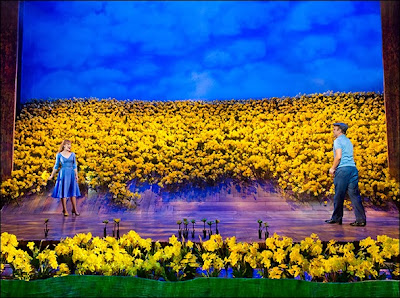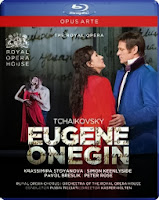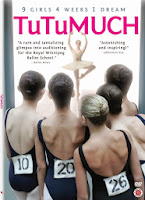Music/lyrics by Andrew Lippa, book by John August; direction/choreography by Susan Stroman
Performances through December 29, 2013
A Midsummer Night’s Dream
Written by William Shakespeare; directed by Julie Taymor
Performances through January 12, 2014
Juno and the Paycock
Written by Sean O’Casey; directed by Charlotte Moore
Performances through December 29, 2013
Luce
Written by JC Lee; directed by Mae Adrales
Performances through November 17, 2013
.jpg) |
| Baldwin and Butz in Big Fish (photo: Paul Kolnik) |
From Daniel Wallace’s novel and Tim Burton’s film, the musical Big Fish is jammed with big emotions, big production numbers, even big songs. But, as in most new musicals, composer/lyricist Andrew Lippa’s conventional tunes (interchangeable ballads, showstoppers and romantic duets) seem an afterthought, but they advance the show by allowing the always inventive Susan Stroman to choreograph the hell out of each number. Thanks to her ingenuity and the show wearing its sentimental heart on its sleeve, it works, up to a point.
Big Fish—book, movie, musical—hits on a poignant theme: reconciliation between family members before death makes it impossible. Edward Bloom, an irrepressible teller of seemingly tall tales, recounts his fantastical stories about his life, which include a giant, a witch and his hometown escaping a disastrous flood. His just-married son Will feels that all he knows about his father is through his stories. So when Edward falls ill, Will checks them out for himself with results that surprise his skepticism.
Stroman’s brisk but unfrantic pacing helps the show keep moving, even when there may be one Bloom tale too many, as well as a few too many endings. But it’s all done to such an illustrious sheen by its boatload of talented performers—Kate Baldwin as the winsome heroine/wife/mother Sandra, Bobby Steggert as the likable son Will and the indestructible Norbert Leo Butz as Edward—that Big Fish overcomes its flaws to pull in its audience hook, line and sinker.
.jpg) |
| Benko in Taymor's Dream (photo: Es Devlin) |
No one would deny that Julie Taymor is a dazzling director, but Shakespeare seems her comeuppance. She did wondrously with The Lion King onstage and Frida onscreen, but when she attacks the Bard (Titus and The Tempest on stage and screen), the results are underwhelming. In A Midsummer Night’s Dream—the inaugural staging at the Theater for a New Audience’s impressive new downtown Brooklyn space—her sumptuous stagecraft obscures the heart at the core of this classic.
For three hours, a whirlwind of visual wonderment from Taymor and her co-conjurers—Donald Holder (lighting), Sven Ortel (projections), Constance Hoffman (costumes), Es Devlin (sets)—time and again causes the audience to “ooh” and “aah” at will. There’s not as much flying as in her woebegone Spiderman as Taymor’s aerial team Airealistic smartly picks its spots to elevate the fairies. Unfortunately, Taymor is on less firm ground with the play proper, since her performers can’t handle Shakespeare’s verse.
Despite a stunning opening—the spirit Puck disappears into the first of the production’s many billowing sheets above and on the stage—Taymor gets the Bard’s impish sprite totally wrong: despite her elasticity, Kathryn Hunter’s mischievous fairy is the least puckish Puck I’ve seen. It’s tempting to give the rude mechanicals a pass, since Bottom and his performing buddies are supposed to be daffy and dumb: but even with such a resourceful actor as Max Casella playing him, Bottom never reaches comedic heights, and his awkward donkey head (which the actor has to manipulate with controls in his hands) is something that might have worked on paper but stops the seemingly foolproof “love scenes” with the fairy queen Titania dead in their tracks.
The less said about the quartet of lovers in the forest—Hermia, Helena, Demetrius and Lysander—the better, since none of the actors and actresses playing them makes any impression, and even Taymor seems stymied, resorting to farcical standbys like ripping clothes off and pillow fights, in desperation. The two pairs of monarchs—Athens’ Theseus and Amazon Hippolyta, King and Queen of the Fairies Oberon and Titania—fare better, with Tina Benko’s Titania by default the best performance in a visually memorable but otherwise deficient Dream.
.jpg) |
| The cast of the Irish Rep's Juno and the Paycock (photo: James Higgins) |
Sean O’Casey’s humane, masterly Juno and the Paycock delicately dissects the fraught emotional lives of a poor Irish Catholic family—carefree father Jack (the peacock/“paycock”), overworked mother Juno, son Johnny (physically and emotionally crippled by the Irish Civil War), and daughter Mary, hoping for a better life elsewhere—in Dublin, circa 1922.
In Charlotte Moore’s straightforwardly-directed Irish Rep production—especially intimate on the tiny stage with James Noone’s set credibly evoking this ultra-nationalist and ultra-religious era—the family and their friends (and even enemies) are presented as flawed but recognizable human beings, as O’Casey merges the personal and political in a way that’s still exciting and incendiary.
And the performances by Ciaran O'Reilly (Jack), Ed Malone (John), Mary Mallen (Mary) and, best of all, J. Smith-Cameron (Juno) keep Moore’s respectful presentation of an enshrined masterpiece out of mothballs.
.jpg) |
| Onaodowan and Hinkle in Luce (photo: Jeremy Daniel) |
JC Lee’s at times auspicious debut Luce attempts too much as it explores how natural cultural divides lead to misunderstandings—and worse. Lee introduces Luce, a seemingly perfect high school student: he’s smart, well-liked and an all-star football player. He’s also the adopted black son of Amy and Peter, white liberals who plucked him from the war-torn Congo at age seven and have raised him right—or so they think. His teacher Harriet notifies Amy about a paper bag full of explosive fireworks in his locker and a provocative pro-terrorist harangue in a journal he keeps at school, so they begin to wonder about their “perfect” son (Amy more than Peter, it must be said).
Although Lee sets up the dramatic fireworks convincingly, his characters—Amy, Peter, Harriet, Luce and Stephanie, Luce’s ex-girlfriend who has a revealing scene with Amy at Starbucks—are less plausibly etched. The play is, literally, too black and white: more shading would help. It’s apparent from the start that Luce is guilty, and there’s no doubt about it when he commits a climactic act of treachery that undermines Lee’s lip-service to ambiguity.
Under May Adrales’s sensitive direction, the quintet of actors givesLuce a veneer of substance. Would that Neal Huff’s befuddled, hands-off dad, Marin Hinkle’s complicated, loving mom, Sharon Washington’s no-nonsense teacher (though I doubt she would tell a student to “F—off”), Olivia Oguma’s typically shallow ex and Okieriete Onaodowan’s appealing but distant Luce weren’t undermined by this provocative but unprovoking drama.
Big Fish
Neil Simon Theatre, 250 West 52nd Street, New York, NY
bigfishthemusical.com
A Midsummer Night’s Dream
Polonsky Shakespeare Center, 262 Ashland Place, Brooklyn, NY
tfana.org
Juno and the Paycock
Irish Rep, 132 West 22nd Street, New York, NY
irishrep.org
Luce
Claire Tow Theater, 150 West 65th Street, New York, NY
lct.org







.jpg)
.jpg)
































